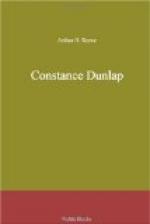Quick as a flash Kitty Carr had leaped to her feet and placed herself between them.
“No, Annie, no. She was a real friend of mine. No—if your own friends had been as loyal as she was to me this would never have happened—I should never have been caught again, for I should never have given them a chance to get it on me.”
“Little fool!” ground out Annie Grayson, raising her arm.
“Here—here—ladies!” interposed Drummond, protruding an arm between the two, and winking sarcastically to the two other men. “None of that. We shall need both of you in our business. I’ve no objection to your talking; but cut out the rough stuff.”
Constance had stepped back. She was cool, cool as Drummond, although she knew her heart was thumping like a sledge-hammer. There was Kitty Carr, in a revulsion of feeling, her hands pressed tightly to her head again, as if it were bursting. She was swaying as if she would faint.
Constance caught her gently about the waist and forced her down on the couch where she had been lying the night before. With her back to the others, she reached quickly into her hand-bag and pulled out the little instrument she had hastily stuffed into it. Deftly she fastened it to Kitty’s wrist and forearm.
She dropped down on her knees beside the poor girl, and gently stroked her free hand, reassuring her in a low tone.
“There, there,” she soothed. “You are not well, Kitty. Perhaps, after all, there may be something—some explanation.”
In spite of all, however, Kitty was on the verge of the wildest hysterics. Annie Grayson sniffed contemptuously at such weakness.
Drummond came over, an exasperating sneer on his face. As he looked down he saw what Constance was doing, and she rose, so that all could see now.
“This girl,” she said, speaking rapidly, “is afflicted with a nervous physical disorder, a mania, which is uncontrollable, and takes this outlet. It is emotional insanity—not loss of control of the will, but perversion of the will.”
“Humph!” was Drummond’s sole comment with a significant glance at the pile of goods on the table.
“It is not the articles themselves so much,” went on Constance, following his glance, “as it is the pleasure, the excitement, the satisfaction—call it what you will—of taking them. A thief works for the benefit he may derive from objects stolen after he gets them. Here is a girl who apparently has no further use for an article after she gets it, who forgets, perhaps hates it.”
“Oh, yes,” remarked Drummond; “but why are they all so careful not to get caught? Every one is responsible who knows the nature and consequences of his act.”
Constance had wheeled about.
“That is not so,” she exclaimed. “Any modern alienist will tell you that. Sometimes the chief mark of insanity may be knowing the nature and consequences, craftily avoiding detection with an almost superhuman cunning. No; the test is whether knowing the nature and consequences, a person suffers under such a defect of will that in spite of everything, in the face of everything, that person cannot control that will.”




